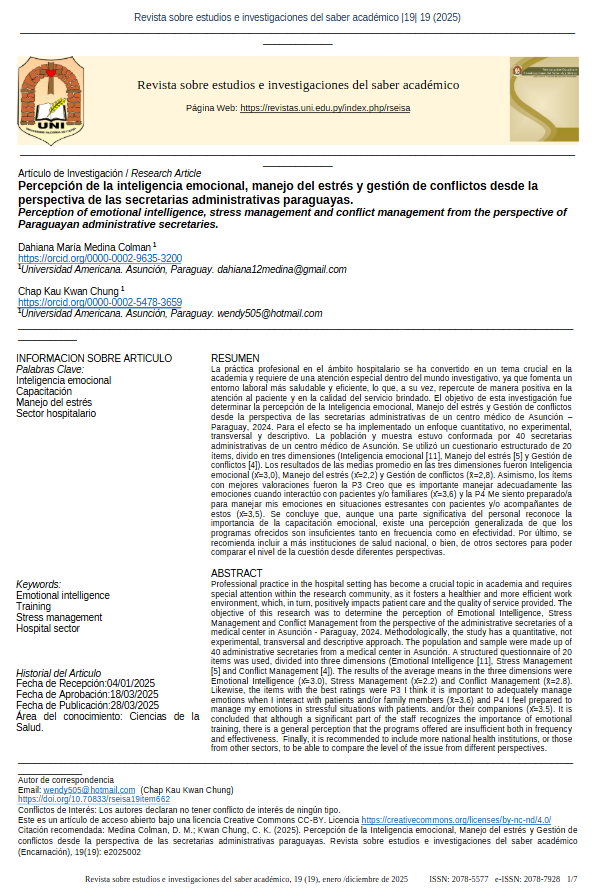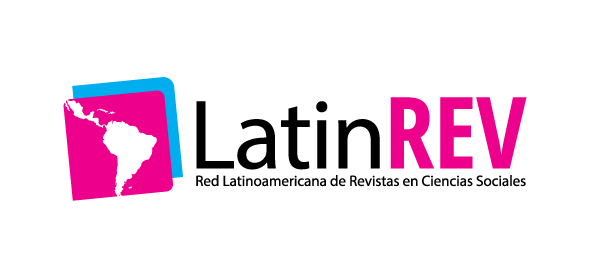Perception of emotional intelligence, stress management and conflict management from the perspective of Paraguayan administrative secretaries
DOI:
https://doi.org/10.70833/rseisa19item662Keywords:
emotional intelligence, training, stress management, hospital sectorAbstract
Professional practice in the hospital setting has become a crucial topic in academia and requires special attention within the research community, as it fosters a healthier and more efficient work environment, which, in turn, positively impacts patient care and the quality of service provided. The objective of this research was to determine the perception of Emotional Intelligence, Stress Management and Conflict Management from the perspective of the administrative secretaries of a medical center in Asunción - Paraguay, 2024. Methodologically, the study has a quantitative, not experimental, transversal and descriptive approach. The population and sample were made up of 40 administrative secretaries from a medical center in Asunción. A structured questionnaire of 20 items was used, divided into three dimensions (Emotional Intelligence [11], Stress Management [5] and Conflict Management [4]). The results of the average means in the three dimensions were Emotional Intelligence (x̄=3.0), Stress Management (x̄=2.2) and Conflict Management (x̄=2.8). Likewise, the items with the best ratings were P3 I think it is important to adequately manage emotions when I interact with patients and/or family members (x̄=3.6) and P4 I feel prepared to manage my emotions in stressful situations with patients. and/or their companions (x̄=3.5). It is concluded that although a significant part of the staff recognizes the importance of emotional training, there is a general perception that the programs offered are insufficient both in frequency and effectiveness. Finally, it is recommended to include more national health institutions, or those from other sectors, to be able to compare the level of the issue from different perspectives
Downloads
References
Abarca Arias, Y. M., Apaza Pinto, Y. T., Carrillo Cusi, G. G., & Espinoza Moreno, T. M. (2021). Inteligencia emocional y satisfacción laboral en enfermeras de un Hospital Regional en Arequipa. Revista Cubana de Enfermería, 37 (1). http://scielo.sld.cu/scielo.php?script=sci_arttext&pid=S0864-03192021000100003
Alegsa, L. (2024). Definición de emoción. Definiciones-de.com. https://www.definiciones-de.com/Definicion/de/emocion.php
Borja Chanchicocha, Pamela Tatiana. (2021). Inteligencia emocional y estrés laboral en personal de enfermería que labora en áreas críticas de un Hospital de Ecuador, 2021. [Tesis de maestría, Universidad Cesar Vallejo].
https://hdl.handle.net/20.500.12692/72914
Camín, L. (2022). ¿Qué son las emociones?. Alcea Psicología y Psicoterapia. https://alceapsicologia.com/blog/que-son-las-emociones-basicas/#:~:text=son%20las%20emociones%3F
Domínguez Chávez, M. K., y Chunga Medina, J. J. (2025). Nivel de inteligencia emocional y el grado de satisfacción laboral del personal de la Red de Salud Pataz. [Tesis de grado, Universidad Nacional de Trujillo]. https://dspace.unitru.edu.pe/server/api/core/bitstreams/7c02c265-0922-489e-88f3-7360b2154da0/content
Duque Ceballos, J. L. (2012). Emociones e inteligencia emocional: Una aproximación a su pertinencia y surgimiento en las organizaciones. Revista Libre Empresa,9(2), 147-69. http://revistasojs.unilibrecali.edu.co/index.php/libreempresa/article/view/589
Goleman, D. (2018). Inteligencia emocional. Kairós. http://www.cutonala.udg.mx/sites/default/files/adjuntos/inteligencia_emocional_daniel_goleman.pdf
Goleman, D., Mckee, A., David, S., y Gallo, A. (2023). Inteligencia Emocional. 2° edición. Harvard Business Review Press. Editorial Reverté.
Lazarus, R. S. (1984). Stress, Appraisal, and Coping. Springer Publishing Company. https://books.google.com.py/books?id=i-ySQQuUpr8C&printsec=frontcover&redir_esc=y#v=onepage&q&f=false
Leal, M. (2023). Inteligencia Emocional y Compromiso Laboral en las MiPymes de Ecuador. Ciencias Administrativas (11)21. https://doi.org/10.24215/23143738e116
Mayer, J. & Salovey, P. (1997). What is emotional intelligence? En P. Salovey & D. Sluyter (Eds.), Emotional development, emotional literacy, and emotional intelligence. New York: Basic Books.
Pereda, F. J., López-Guzmán, T., y González, F. (2018). La inteligencia emocional como habilidad directiva. Estudio aplicado en los municipios de la provincia de Córdoba (España). Nóesis. Revista de Ciencias Sociales y Humanidades, 27(1), 98–120. https://doi.org/10.20983/noesis.2018.1.5
Petrides, K. V., Frederickson, N., & Furnham, A. (2004). The role of trait emotional intelligence in academic performance and deviant behavior at school.
Personality and Individual Differences, 36, 277–293. https://
doi.org/10.1016/S0191-8869(03)00084-9
Rodrigues, N., & Rebelo, T. (2021). Análise do impacto das facetas da inteligência
emocional (traço) e da confiança nos colegas no desempenho de tarefa. Revista
Brasileira de Gestão de Negócios, 23(3), 470-487. https://digituma.uma.pt/bitstream/10400.13/3688/1/An%c3%a1lise%20do%20impacto%20das%20facetas%20da%20intelig%c3%aancia%20.pdf
Salovey, P. (1997). La inteligencia emocional: Un pensador con un corazón que percibe, comprende y maneja relaciones sociales. Rafael Bisquerra. https://www.rafaelbisquerra.com/la-inteligencia-emocional-segun-salovey-y-mayer/
Salovey, P. & Mayer, J. (1990). Emotional Intelligence. Imagination, cognition and personality, 9(3), 185-211. http://gruberpeplab.com/3131/SaloveyMayer_1989_EmotionalIntelligence.pdf

Published
How to Cite
License
Copyright (c) 2025 Dahiana María Medina Colman, Chap Kau Kwan Chung

This work is licensed under a Creative Commons Attribution 4.0 International License.
Creative Commons Attribution License CC-BY
You are free to:
Share — copy and redistribute the material in any medium or format.
Adapt — remix, transform, and build upon the material for any purpose, including commercially.
Under the following terms:
Attribution — You must give appropriate credit, provide a link to the license, and indicate if any changes have been made. You may do so in any reasonable way, but not in any way that suggests that you or your use is endorsed by the Licensor.






